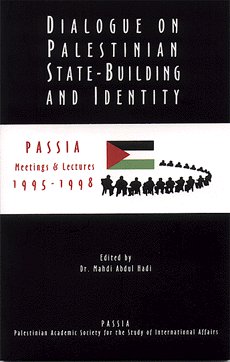Dialogue on Palestinian State-Building and Identity
This publication is a selection of the full texts or summaries of 18 meetings on state-build¬ing and identity issues that were held at PASSIA during the period 1995-1998 against the background that the Palestinian people were directly involved in a chain of social and geo¬political events, which transformed their society from being a Diaspora and Intifada-based society to a civil society in the making with a more or less legitimized leadership that is preoccupied with negotiating towards a political settlement. The papers in this volume deal with issues such as the evolution of the PA, the role of the opposition, elections, women’s participation, the PLC, government, civil society, national identity, the peace process, political trends and new elites.
Overview
The Meetings Program has been a major component of our activities ever since PASSIA’s foundation in 1987. The roundtable meetings and briefing sessions are designed to promote discussion and debate on issues of concern to Palestinians, whereby dialogue is encouraged on three different but equally important tracks: Palestinian-Palestinian, Palestinian-Israeli, and Palestinian-international. By providing a venue for the exchange of a plurality of local and foreign perspectives, PASSIA strives to ensure that its symposia and workshops be open, self-critical and conducted in a spirit of harmony and cooperation.
The tradition of political debate among Palestinians, as well as the huge number of newly emerging issues of concern related to the peace process, democratization, state- and institution-building, transformation of the society, and establishment of a new political structure and leadership, is clearly reflected in the importance attributed to the roundtable meetings at PASSIA.
Acknowledging the significance of intra-Palestinian debates in general, PASSIA began a few years ago to organize some of its meetings around crucial topics that affect the Palestinian house, at times obstructing the state-building process, yet are hardly addressed.
The specific series on state-building and identity issues was initiated against the background that the Palestinian people are directly involved in a chain of social and geopolitical events, which transform their society from being a Diaspora and Intifada-based society to a civil society in the making with a more or less legitimized leadership that is preoccupied with negotiating towards a political settlement.
The intention of this dialogue was to encourage debate among Palestinian academia and within the wider society on issues that unfolded in the period following the signing of the Declaration of Principles in September 1993, to address and discuss ways to unite the different segments of Palestinian society, to eliminate misperceptions, and to reach a common stand for the tasks ahead.
PASSIA believes that in order to understand and influence the direction in which Palestinian society is heading, it is important to address and examine such issues at the earliest stage possible and to try to overcome prevailing obstacles in order to build an appropriate basis for the future.
What follows is a selection of the full texts or summaries of meetings that were held at PASSIA during the period 1995-1998. When putting together the contents, the goal was to provide a compilation of texts that gives all those interested an insight into the pressing issues of today and into the ongoing debate on the Palestinian state-building process and questions of identity. It is hoped that the reader will find the selection both comprehensive and informative.
Jerusalem, December 1998
Dr. Mahdi Abdul Had - Head of PASSIA
Introduction
From Occupation to the Palestinian Authority –
A Chapter in Palestinian Nation Building
Dr. Mahdi Abdul Hadi

